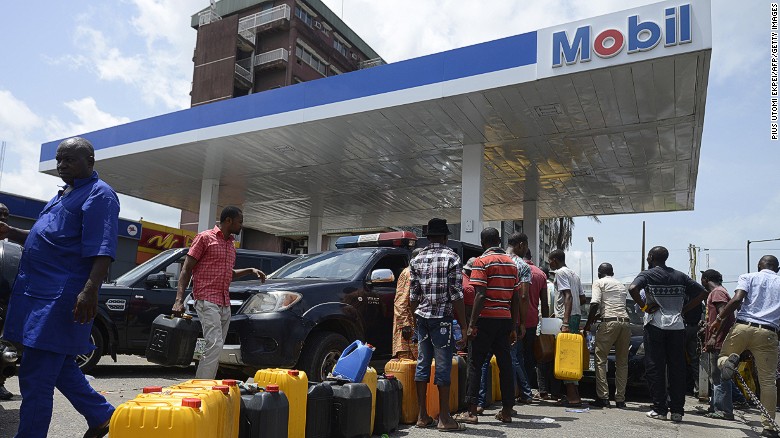Barely four months after the federal government adjusted the pump price of petrol upwards from N86.50 to N145 per litre to stabilise product importation and distribution, oil traders have raised concern over likely scarcity of the product.
The fear expressed by the marketers stemmed from the alleged inability of the Nigerian National Petroleum Corporation (NNPC) to supply crude to some oil traders and refineries in exchange for refined products, under the Direct Sales-Direct Purchase (DSDP) contractual arrangements initiated with some selected oil traders and foreign refineries some months ago.
The marketers were also alarmed by the increasing challenges facing them in accessing foreign exchange, and threatened that they might abandon petrol importation in the hands of only the NNPC, potentially plunging the country into another energy crisis.
They warned that the pegging of the pump price at N145 was based on N285 exchange rate and that the depreciation of the Naira in the inter-bank market to an average of N315 has created a huge gap left to be filled. Warning that it was not feasible for the price to remain at N145 with the current FX reality.
But the Group Managing Director of NNPC, Dr. Maikanti Baru has dismissed the fear of possible scarcity, saying that the corporation has continued to meet its obligations to marketers and foreign refineries in the areas of foreign exchange allocation and supply of crude oil under its DSDP contracts with the oil traders.
While the marketers alleged that the corporation has defaulted in the supply of crude oil to the foreign refineries, Baru dismissed this claim, revealing that NNPC currently accounts for 90 per cent of petrol imported into the country and has 1.3 billion litres of petrol in reserves “and is not about to let the country go through another crisis of scarcity”.
Following the controversy, which trailed the NNPC’s Offshore Processing Arrangement (OPA, the corporation had adopted the DSDP framework under which it provides crude to selected traders and refineries in return for petroleum products in full and extra margins, unlike the OPA.
DSDP also eliminates all the cost elements of middlemen and gives NNPC the latitude to take control of sales and purchase of crude oil transaction with its partners.
But sources close to the marketers said the corporation had defaulted in the supply of crude oil to the foreign refineries, thus threatening the steady supply of petroleum products in the country.
According to them, lack of crude oil due to the attacks on oil facilities in the Niger Delta, has hampered the corporation’s ability to meet its contractual obligations under the DSDP.
The marketers said that since the programme started, the NNPC had not been able to supply crude oil to the oil traders.
“The militants stopped almost all the onshore production and because of this, NNPC has no crude to supply to the traders. The oil traders supplied petrol initially but stopped when the NNPC was not bringing crude. The traders had to stop because they did not want a repeat of the 2008/2009 crisis when they were indebted to the tune of over $3 billion due to NNPC’s inability to meet obligations. Fresh crisis is looming.”
Having lost over 70 per cent onshore and shallow water production to militant attacks, the NNPC can no longer access the 445,000 barrels per day allocation to the refineries, which is used to service the corporation’s DSDP agreement.
With the loss of production from the traditional terrains, the country’s oil revenue is currently derived solely from deep offshore production where the NNPC has Production Sharing Contracts (PSCs) arrangement with some international oil companies (IOCs).
The deep offshore fields sustaining Nigeria’s crude oil production include: Shell’s 225,000 barrels per day capacity Bonga field; Chevron’s 250,000 barrels per day capacity Agbami field; Total’s 185,000 bpd Akpo and 180,000 bpd Usan deepwater fields; as well as ExxonMobil’s 190,000 barrels per day Erha field.
Also Total’s 200,000 bpd Egina deepwater field being developed at the cost of $16 billion will start production in 2017 after the $3.3 billion Floating Production Storage Offloading (FPSO) vessel arrives the country in March or April 2017.
However, some of the five producing fields have not attained their nameplate production capacity.
Baru however in a telephone chat yesterday said there was no looming scarcity.
On the issue of alleged non-supply of crude to the traders, Baru said “at the moment, we have been giving them and I have also done a tender as a backup in case I have any issue.”
“So, there is no cause for alarm,” he added.
Also speaking on the foreign exchange challenges, Baru stated that NNPC has been assisting some of the marketers with proven financial capacity to pay for foreign exchange provided by International Oil Companies (IOCs).
“The criteria is important because we could give some of them the foreign exchange, but they may not have the capacity to pay for it. We checked with their banks to confirm that they have the financial capacity because we don’t want a situation where we give them the forex and its diverted or they can’t pay for it. So we carry out a thorough evaluation. We have NNPC, Central Bank and also PPPRA representatives on the committee that evaluates them on the basis of capacity to perform.
“And once we are satisfied on that basis, we now give them forex. To say there is no forex, I don’t think it is correct. At the moment as I am talking to you, I have over 1.3 billion litres and that is more than enough for this September. We have sufficient quantities and not in any scarcity. And we also have direct sales, direct purchase where I give them crude oil and they bring in petrol for me or any product that I choose to bring in,” Baru explained.
But some marketers who faulted Baru’s claim, alleged that the challenges of accessing foreign exchange has also hampered their ability to import petrol, thus threatening product availability.


 Naira4 weeks ago
Naira4 weeks ago
 Naira4 weeks ago
Naira4 weeks ago
 Travel4 weeks ago
Travel4 weeks ago
 Naira3 weeks ago
Naira3 weeks ago
 Jobs4 weeks ago
Jobs4 weeks ago
 Naira4 weeks ago
Naira4 weeks ago
 Investment4 weeks ago
Investment4 weeks ago
 Travel4 weeks ago
Travel4 weeks ago

























